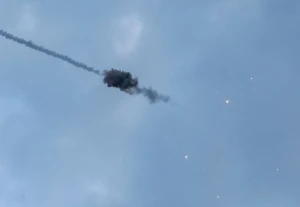
Poland considers Ukraine's proposal on licensing of agricultural products to be good
Polish Minister of Agriculture Robert Telus called Ukraine's proposal for licensing agricultural products a good one and is ready to consider this plan in more detail.
This is reported by PAP.
"The Ukrainian side said that if Poland says that it does not need four types of grain by the end of the year, the licences will not be issued. This is an issue that our side has to consider, but on the surface, this proposal looks like a good offer," Telus said.
He stressed that the final decision will be made by Poland, not Ukraine.
Telus added that now "it is important to develop long-term mechanisms".
"If we say that Ukraine wants to join the European Union, and it does, and we agree with it politically, if we don't develop the mechanisms that will be used to make decisions today, they will never work well. So we will definitely work on this," the minister concluded.
Some details regarding ban on Ukraine grain imports
On February 2, Polish farmers began blocking checkpoints on the border with Ukraine. They were outraged that the uncontrolled inflow of Ukrainian grain to Poland had caused prices for their products to plummet. Local farmers argue that Ukrainian grain should have been transported through Poland only to ports, but it ended up on the Polish market.
On March 29, Polish Prime Minister Morawiecki said that Poland promised to introduce rules that would limit the inflow of Ukrainian grain to the country, explaining that it could destabilize the import market.
On April 7, Ukraine agreed to stop exporting grain to Poland, and on April 15, the country approved a ban on the import of Ukrainian grain and other food products to Poland. Later, Poland approved a ban on the import of Ukrainian grain and other food products to Poland. The government emphasized that this decision does not change the country's position on support and friendship with Ukraine.
In Romania, farmers demanded a ban on grain imports and transit from Ukraine, threatening a nationwide protest. Meanwhile, Hungary was the second country to temporarily ban imports of grain and oilseeds from Ukraine, following Poland. On April 16, media reported that Bulgaria was also considering refusing to import Ukrainian grain. On the same day, a spokesman for the European Commission said that unilateral actions by EU member states on trade were unacceptable.
On April 17, Slovakia became the third EU country to ban imports of Ukrainian grain and other agricultural products.
On April 18, it became known that Poland would receive EUR 30 million in aid from the EU amid the crisis with Ukrainian grain. After that, Warsaw decided to unblock the transit of Ukrainian agricultural products to European ports on April 21.
On April 29, the European Commission agreed with Bulgaria, Hungary, Poland, Romania, and Slovakia on the transit of food produced in Ukraine through their territory.
On May 12, Poland, Bulgaria, Romania, Slovakia, and Hungary called on the European Commission to extend the embargo on agricultural products from Ukraine until the end of the year. Later that month, it was reported that four EU countries would insist on extending grain import restrictions from Ukraine until October. At the same time, Hungary wanted to extend the restrictions until 2024.
On August 24, it was revealed that Hungary requested an extension of the EU's ban on Ukrainian grain imports.
Following this, Poland's Minister of Agriculture, Robert Telus, stated that Poland would also urge the European Union to extend the ban on Ukrainian grain imports. If the EU refuses, Poland would consider implementing its own restrictions. He noted that Slovakia, Bulgaria, Romania, and Hungary had similar intentions.
On Friday, September 15, the European Commission decided not to extend the ban on Ukrainian grain exports to the EU: Poland, Hungary, and Slovakia announced that they would extend the embargo unilaterally.
Taras Kachka, Deputy Minister of Economy and Trade Representative, said that negotiations on agriculture had turned into aggression on the part of Poland and hints of influence during Ukraine's accession to the EU.
On September 19, Prime Minister Denys Shmyhal said that Ukraine will file a lawsuit with the World Trade Organization and may retaliate by banning imports of goods from Poland, Hungary, and Slovakia. The next day, Polish President Andrzej Duda criticized Ukraine's actions regarding the Polish embargo on Ukrainian grain and said that he and his government would defend the interests of Polish farmers.
Polish Prime Minister Mateusz Morawiecki also reacted to Ukrainian President Volodymyr Zelenskyy's speech at the UN General Assembly and announced a possible extension of the ban on food exports if Kyiv continues to "escalate the conflict."
Poland summons Ukraine's ambassador over Zelenskyy's statements that blocking grain exports helps Russia
President Andrzej Duda says he is upset about "Ukraine's lack of understanding of the grain issue," and stresses that grain transit through Poland continues.
- News













































